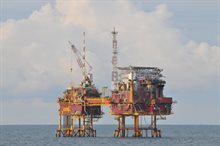Oil and gas extraction
The North Sea contains large oil and gas reserves. Their extraction contributes to the Dutch economy in a major way. This is why oil and gas extraction are designated activities of great national importance in the National Water Plan. A number of platforms of the approximately 160 production locations in the Dutch part of the North Sea are located in territorial waters. Most of the platforms are located on the central part of the Dutch Continental Shelf.
Spatial Planning on the North Sea
The use of space for oil and gas extraction requires continuing attention. No shipping or other use is allowed in a 500-metre zone around the platforms. This places local restrictions on the fishing industry, shipping and recreation (craft). It is not permitted to drag fishing nets over the seabed and in the water column in this security zone. When choosing the location for a drilling platform, shipping and other uses must be taken into account. In clearways for shipping, mining activities are, in principle, not permitted.
However, most of the interaction is with wind energy areas. Permits granted for wind farms contain a provision on the coordination with oil and gas extraction within the same area. Conversely, conditions are defined for oil or gas platforms and their positioning for harmonisation with wind energy based on the Mining Decree.
Granting permits for oil and gas extraction
An Environmental Impact Assessment is compulsory for the extraction of oil and gas. Inside the 12-mile zone, the Environmental Impact Assessment is part of the permit procedure laid down in the Environmental Law (General Provisions) Act. Outside the territorial waters, the granting of permits falls under the Mining Act; here, all aspects of the Water Act are also taken into consideration. The requisite pipelines for the transport of oil and gas between mining installations fall under the Mining Act.
The Ministries of Economic Affairs and Climate Policy and Infrastructure and Water Management harmonise the various legal frameworks with each other when permits are being granted. State Supervision of Mines (SSM) plays an advisory role in this and is responsible for the inspection and enforcement of permit conditions.
The conditions linked to the permit relate to safety, health, effective extraction, the environment and working conditions. The Mining Act stipulates the removal of platforms and pipelines that are no longer in use.
CO2 storage
Exhausted gas fields can be used for the storage of CO2. The National Water Plan (NWP) specifies locations for the implementation of two pilots with this technology. In addition, in the NWP the entire Exclusive Economic Zone is designated as a search area for CO2 storage locations. The capture and storage of CO2 is an important mainstay of Dutch climate policy.

This map is not recently made. Fir more recent maps, please visit the NLOG website.
